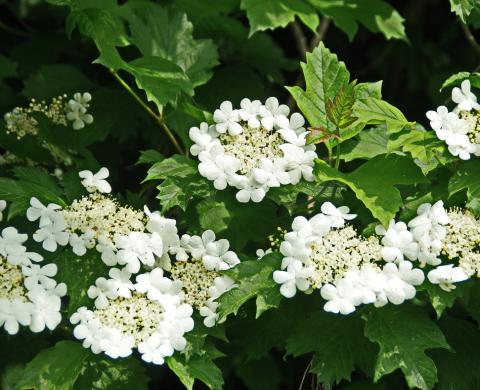May Gardening Tips

Protect yourself from ticks by tucking your pants into your socks and wearing long sleeved shirts with snug collars and cuffs.
Light colored clothing is best, as it makes it easier to spot and brush off ticks. Treating clothes with permethrin provides additional protection. The two most common species of ticks in New Hampshire are dog ticks and black legged ticks. Black legged ticks are especially important to watch for because they can transmit the pathogens that cause Lyme disease, babesiosis, anaplasmosis and Powassan encephalitis in people.
Don’t be too hasty to plant warm season vegetables in the garden.
Crops like tomatoes, peppers, squash and cucumbers should only be planted once the soil has warmed, the risk of frost has passed, and the nighttime temperature stays above 50°F. In New Hampshire, these conditions are usually met from mid-to-late May, depending on whether you garden in the southern or northern part of the state. Tender crops like cucumbers, pumpkins, squash and melons that love hot weather can be sown directly from seed in the garden earlier in May by warming the soil with hot caps or cloches one week before planting. Hot caps and cloches warm the soil and encourage germination and should be kept in place until young plants emerge from seed and have developed a couple of sets of true leaves.
Prune flowering trees and shrubs at the proper time.
Spring flowering shrubs (those that bloom before mid-June) should be pruned soon after they finish flowering. If they are pruned early in the spring before they bloom you will remove the flower buds. Examples of spring flowering shrubs include lilac, forsythia, azalea, rhododendron, viburnum and fothergilla. Summer flowering shrubs should be pruned before growth begins in the spring, because these plants produce flower buds on new wood during the current season. Shrubs such as panicle hydrangea, clethra, rose of Sharon, potentilla and spirea.
Purchase and plant perennials that are labelled for your USDA hardiness zone.
Hardiness zones refer to the average annual minimum winter temperature in an area. For example, zone 4b represents average minimum winter temperatures of -20 to -25°F. Of course, winters in New Hampshire are seldom average. It might stay extremely cold for a week or more or fluctuate from very warm to very cold. The length of cold, its depth and temperature fluctuations can affect whether a plant survives, even if it is listed as being hardy enough for an area. While perennials that are hardy to zone 5 or lower are suitable for most of New Hampshire, they may still suffer winter damage.
Renovate or seed a new lawn.
Although fall is the best time to establish a healthy lawn, it can be done in May if frequent irrigation is applied after seeding. Regardless of whether you are starting a new lawn from scratch or renovating and repairing an old one, you will need to analyze the site and prepare the soil. If your is lawn is thin and patchy with weed issues, there is probably a limiting soil factor that needs to be corrected. Examples may include poor or excessive drainage, soil compaction, acidic soil pH, or nutrient deficiencies. A good place to start is with a soil test, which will tell you the soil pH, availability of selected nutrients, organic matter content and lead level, and give you recommendations on how much lime and fertilizer to add.
Invasive plants are often the first to leaf out in the spring, making them stand out against native vegetation.
Plan to control the invasive plants on your property early in the season before they go to seed. The main means of managing invasive plants are with mechanical controls (pulling or digging) or chemical controls (herbicide treatment). The most effective management technique varies by species and its stage of development. Small diameter woody plants and herbaceous plants can be pulled out or dug up when their numbers are small. Other mechanical treatments include smothering plants with heavy plastic sheeting or repeatedly cutting or mowing invasive plants. A final option is to treat mature shrubs or large populations of herbaceous plants may be more efficiently treated with an herbicide.
Do you love learning about stuff like this?
SUBSCRIBE TO GRANITE STATE GARDENING
A monthly newsletter for New Hampshire gardeners, homesteaders and plant-lovers of all kinds, that includes seasonal suggested gardening tips, upcoming events and articles with proven solutions for your garden and landscape.
Got questions? The Ask UNH Extension Infoline offers practical help finding answers for your home, yard, and garden questions. Call toll free at 1-877-398-4769, Monday to Friday, 9 a.m. to 2 p.m., or e-mail us at answers@unh.edu.
